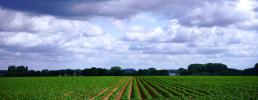Horizon Europe Waste4Bio Project: Promoting the use of food waste through multiplatform biorefineries
- Type Project
- Status Signed
- Execution 2025 -2027
- Assigned Budget 165.312,96 €
- Scope Europeo
- Autonomous community Castilla y León
- Main source of financing Horizon Europe 2021-2027
- Project website https://doi.org/10.3030/101153928
Imagine a world where food waste is not a burden, but a valuable resource. Every year, nearly one-third of global food production is wasted, leading to significant resource depletion and environmental damage. Traditional management methods fall short, revealing an urgent need for innovative solutions. Supported by the Marie Skłodowska-Curie Actions, the Waste4Bio project aims to revolutionize how we treat food waste by creating an advanced multi-platform biorefinery. Waste4Bio will convert food waste into near-pure biohydrogen (bioH2), microalgal biomass, and biodegradable biopolymers (PHAs) through the development and application of well-designed bioH2-producing reactors, algal bacterial photobioreactors, and anoxygenic fermenters. By improving our understanding of the microbiome involved at each stage of the food waste biorefinery, Waste4Bio seeks to maximize efficiency and output.
Food waste (WF) is a significant global issue, with approximately one-third of all food produced wasted annually. WF biorefineries represent a green pathway to valorize the vast untapped potential of WF by bioconverting them into marketable products and fuels within a circular bioeconomy framework. However, to date, WF biorefineries have not reached the level of maturity required for large-scale and widespread implementation. To meet the European Green Deal and the Sustainable Development Goals, the Waste4Bio project seeks to design and validate an innovative and cost-competitive WF biorefinery for the cascade production of biohydrogen (bioH₂) and biodegradable biopolymers (polyhydroxyalkanoates; PHAs). To this end, Waste4Bio will go beyond the state-of-the-art of dark fermentation to design advanced mass transfer hydrogen production fermenters capable of supporting high biocatalyst density and superior bioH₂ production performance. Waste4Bio will also optimize the developed acidogenic gas mixture using highly engineered algal-bacterial photobioreactors to produce near-pure bioH₂ and transform carbon dioxide into algal biomass, thus contributing to a net-zero carbon balance for fresh food valorization. Furthermore, the hydrogen deposition broth (DF), rich in short-chain carboxylic compounds, will be further valorized for the production of high-efficiency PHAs with purple phototrophic bacteria (PPB). This action also seeks to deepen the understanding of the microbiome, its associated potential functionality, and the ecological interactions involved at each stage of fermentative bioH₂ production, photosynthetic enhancement of bioH₂, and PHA production from PPB. With transferable skills and a cross-sectoral nature, Waste4Bio will apply an interdisciplinary approach encompassing chemical and bioprocess engineering, environmental biotechnology, microbiology, and bioinformatics. A techno-economic model and commercialization roadmap will also be created to facilitate the full exploitation of Waste4Bio.
- UNIVERSIDAD DE VALLADOLID
- UNIVERSIDAD REY JUAN CARLOS
- FCC MEDIO AMBIENTE SAU







